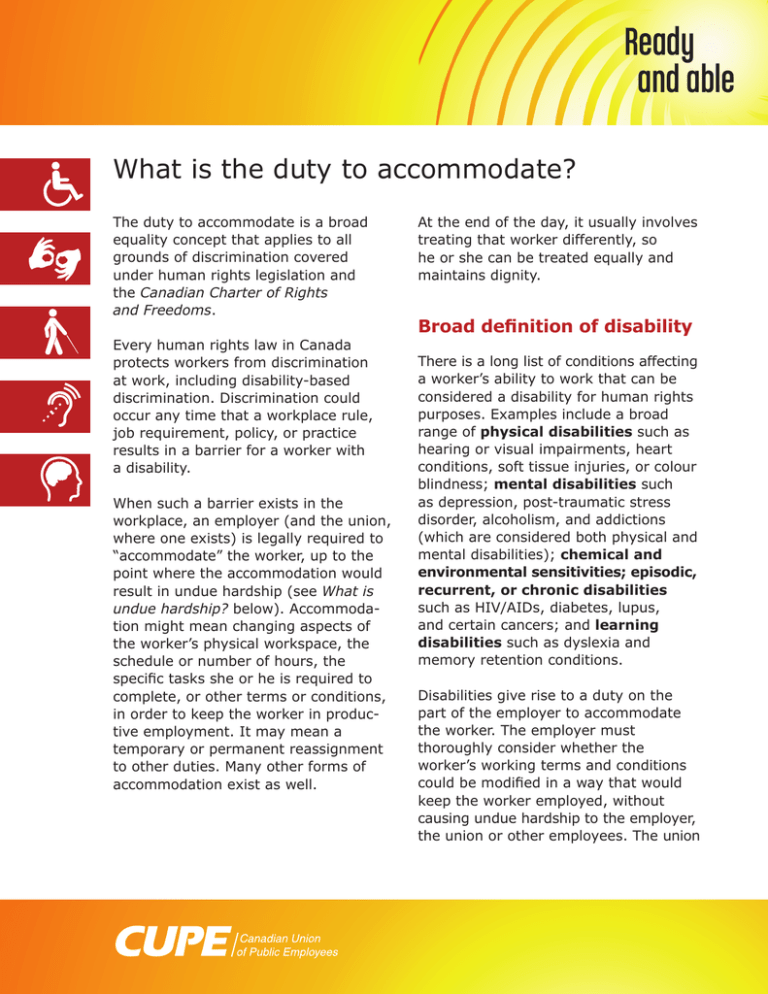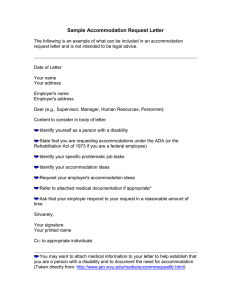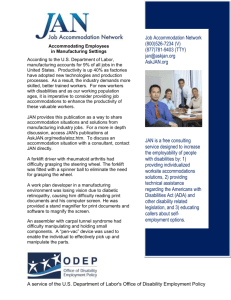What is the duty to accommodate?
advertisement

Ready and able What is the duty to accommodate? The duty to accommodate is a broad equality concept that applies to all grounds of discrimination covered under human rights legislation and the Canadian Charter of Rights and Freedoms. Every human rights law in Canada protects workers from discrimination at work, including disability-based discrimination. Discrimination could occur any time that a workplace rule, job requirement, policy, or practice results in a barrier for a worker with a disability. When such a barrier exists in the workplace, an employer (and the union, where one exists) is legally required to “accommodate” the worker, up to the point where the accommodation would result in undue hardship (see What is undue hardship? below). Accommodation might mean changing aspects of the worker’s physical workspace, the schedule or number of hours, the specific tasks she or he is required to complete, or other terms or conditions, in order to keep the worker in productive employment. It may mean a temporary or permanent reassignment to other duties. Many other forms of accommodation exist as well. At the end of the day, it usually involves treating that worker differently, so he or she can be treated equally and maintains dignity. Broad definition of disability There is a long list of conditions affecting a worker’s ability to work that can be considered a disability for human rights purposes. Examples include a broad range of physical disabilities such as hearing or visual impairments, heart conditions, soft tissue injuries, or colour blindness; mental disabilities such as depression, post-traumatic stress disorder, alcoholism, and addictions (which are considered both physical and mental disabilities); chemical and environmental sensitivities; episodic, recurrent, or chronic disabilities such as HIV/AIDs, diabetes, lupus, and certain cancers; and learning disabilities such as dyslexia and memory retention conditions. Disabilities give rise to a duty on the part of the employer to accommodate the worker. The employer must thoroughly consider whether the worker’s working terms and conditions could be modified in a way that would keep the worker employed, without causing undue hardship to the employer, the union or other employees. The union also has a duty. It must not block a reasonable accommodation, or negotiate collective agreement provisions which have a discriminatory effect. Medical information is usually required by the employer to understand the extent of the limitations requiring accommodation. However, everyone should still try to maintain the maximum medical privacy possible while exploring accommodations (see The accommodation-seeker’s responsibilities below). Sometimes the worker with a disability may be discriminated against not on the basis of their actual disability or its limitations, but because the employer is making arbitrary assumptions or impressions about the disability or its limitations. The law also protects against that type of perception-based discrimination. Exploring accommodation: A joint inquiry Finding a reasonable accommodation is a joint inquiry. In a unionized workplace there are three parties to the inquiry: the employee, the employer and the union. An employer cannot exclude the union from the process. The employer’s duty to inquire Once an employer has been made aware (either by the union or the employee) of a disability requiring accommodation, they must begin the process of finding a reasonable accommodation. This process begins by making meaningful inquiries into the nature and extent of the employee’s disability-related needs. In some circumstances, the employer will be expected to inquire about the possible existence of a disability requiring accommodation. For example, in the case of a worker exhibiting unusual workplace behavior, or who is excessively absent, the employer would be expected to inquire about the possibility of a disability requiring accommodation. The accommodation-seeker’s responsibilities The worker seeking an accommodation has a duty to disclose the general nature of their disability and any restrictions to the employer. This information makes it possible for the employer to properly accommodate the worker. The worker must provide sufficient information concerning limitations, however revealing an actual diagnosis is not always necessary and should be avoided wherever possible. The worker should cooperate with the employer and the union throughout the accommodation process by communicating with them, and by accepting a reasonable accommodation. Union responsibilities The union must be actively involved in the process of accommodation. The union can be particularly useful in helping to determine appropriate accommodation alternatives, and can also represent the worker’s interest in meetings with the employer. The union also has to protect the 2 interests of other members, ensuring an accommodation doesn’t create undue hardship for other members. In particular cases, the union may need to be flexible with the application of its own collective agreement, which may include waiving certain provisions, like a posting requirement or seniority provision. • • • • Examples of workplace accommodations Many workplaces are not designed with people in mind, whether or not they have a disability. Some accommodations are simple and benefit the entire workforce. Such changes might include: • • • • • Building access ramps and automatic doors; Adding extra lighting; Lowering shelves and equipment in a way it makes them accessible to the mobility-impaired; Instituting “no scent” policies and taking other steps to ensure that chemical sensitivities are not triggered by workplace hazards; Adding flashing lights to an alarm system to ensure that hearing-impaired workers understand the alarm. There are many other forms of accommodation, depending on the particular needs of the accommodation-seeker. Accommodation may involve: • • Tolerating otherwise excessive absenteeism related to the disability; Modifying or bundling specific duties so that the employee can continue participation in the workplace; • • Changing existing schedules or the numbers of hours worked; Allowing a reasonable time for the accommodated worker to have a trial period in a new position; Allowing seniority to accrue during disability-related absenteeism or reduced hours; Tolerating a sub-par level of productivity; Transferring the accommodation-seeker to a less stressful worksite or one which lessens the impact of the work commute on her or his disability; In certain circumstances, fashioning an entire program of working terms and conditions that allows the worker to remain in productive employment. There are as many accommodations as there are individuals requiring accommodation. The extent of the duty is that the employer must accommodate to the point of undue hardship. What is undue hardship? The duty to accommodate ends 1. When the worker has been successfully accommodated (though new needs may arise, and an employer has a responsibility to re-accommodate over the course of a worker’s career); 2. When the point of undue hardship is reached by the worker, employer or union in accommodating the worker. Arbitrary assumptions or impressions about what is possible do not qualify as undue hardship. Substantial evidence and documentation are required. 3 The Supreme Court of Canada has indicated that factors to be considered in determining the point of undue hardship include: • • • • • • Financial costs; Safety at work; Disruption of the collective agreement; Impact on the rights of other workers; Interchangeability of worker positions or workplace facilities; The size of the operation. The two most important factors are financial costs and safety risks. Financial costs must be directly related to the accommodation. They must be proven and not merely speculative, and they must be substantial to the point that the viability of the operation is impaired by the cost. Safety concerns must always be taken seriously. Employers sometimes try to claim they have safety concerns as an excuse to avoid their duty to accommodate. In determining the point of undue hardship, safety concerns must be real and reasonable, not based on speculation. It can include the safety of the employee seeking accommodation, coworkers, clients, customers, patients, or others. Showing our mettle Enforcing the right to be accommodated Unionized workers have an advantage over non-unionized workers. If their employer is failing to properly accommodate them, they can bring a complaint through the grievance procedure, and go to arbitration if necessary. CUPE members have been highly successful in this regard. CUPE shop stewards across Canada are assisting workers requiring accommodation every day. CUPE staff are negotiating accommodation agreements, return-to-work agreements, and providing duty to accommodate training to its members. CUPE’s work on disability-related issues is guided, in part, by the Persons with Disabilities National Working Group, consisting of members with disabilities who advise the union on disabilityrelated issues. For more information cupe.ca/disability-rights 4



